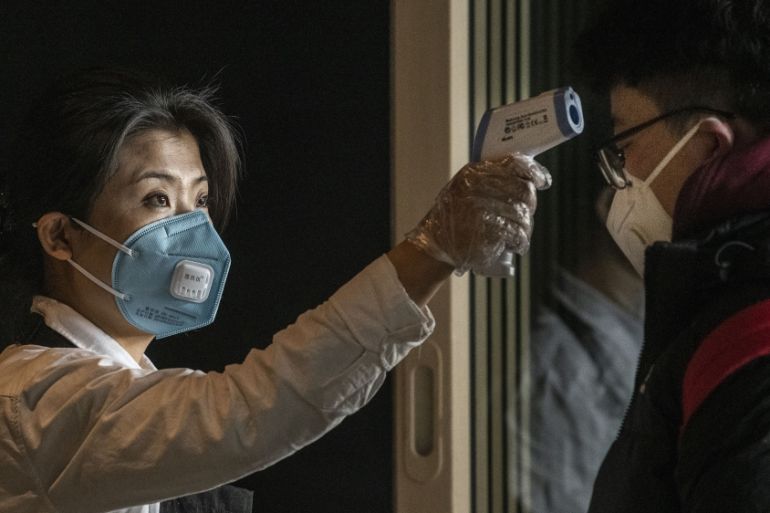How does coronavirus spread and how can you protect yourself?
COVID-19 spreads from person to person in close proximity, similar to other respiratory illnesses.

The new coronavirus continues to spread around the world, prompting governments to step up efforts to contain the spread of the disease it causes, offically known as COVID-19.
More than 5,700 people have died globally from the disease, while more than 152,00 infections have been confirmed in dozens of countries, according to the World Health Organization, which has now declared the outbreak a pandemic.
Keep reading
list of 3 itemsTimeline: How the new coronavirus spread
Coronavirus: Which countries have confirmed cases?
Here is what you need to know:
How is the coronavirus spreading?
The coronavirus – known as COVID-19 – spreads from person to person in close proximity, similar to other respiratory illnesses, such as the flu.
Droplets of bodily fluids – such as saliva or mucus – from an infected person are dispersed in the air or on surfaces by coughing or sneezing.
These droplets can come into direct contact with other people or can infect those who pick them up by touching infected surfaces and then their face.
According to scientists, coughs and sneezes can travel several feet and stay suspended in the air for up to 10 minutes.
It is not yet known how long the virus can survive outside a host but, in other viruses, it ranges from a few hours to months.
Transmission is of particular concern on transport, where droplets containing the coronavirus could pass between passengers or via surfaces like aeroplane seats and armrests.
The incubation period of the coronavirus, the length of time before symptoms appear, is between one and 14 days.
Although not yet confirmed, Chinese health authorities believe the virus can be transmitted before symptoms appear.
This would have major implications for containment measures, according to Gerard Krause, head of the Department for Epidemiology at the Helmholtz Centre for Infection.
“It’s unusual for respiratory diseases transmissible even before the first symptoms have occurred,” he told Al Jazeera.
“But the consequences is that if it happens then they have no public health means to sort out or to identify people at risk of transmitting, because they don’t even know that they’re ill yet.”
Can people be immune to the new coronavirus?
Viruses that spread quickly usually come with lower mortality rates and vice versa.
As the virus is an entirely new strain, it is believed that there is no existing immunity in anyone it will encounter.
Some level of immunity will naturally develop over time, but this means that those with compromised immune systems, such as the elderly or sick, are most at risk of becoming severely ill or dying from the coronavirus.
Although the total number of deaths has now exceeded those recorded during the 2002-2003 outbreak of severe acute respiratory syndrome (SARS), the current mortality rate is much lower than that of SARS.
The coronavirus mortality rate stands at 2.4 percent, while SARS killed 9.6 percent of those infected.
How can people protect themselves? Are face masks useful?
In terms of self-protection and containing the virus, experts agree that is important to wash your hands frequently and thoroughly with soap; cover your face with a tissue or your elbow when coughing or sneezing; visit a doctor if you have symptoms; and avoid direct contact with live animals in affected areas.
While face masks are popular, scientists doubt their effectiveness against airborne viruses.
Masks may provide some protection to you and others, but because they are loose and made of permeable material, droplets can still pass through.
Many countries have advised people travelling back from China to self-quarantine for at least two weeks.
What is being done to stop the spread, and when will a vaccine become available?
China has placed Wuhan and more than a dozen other cities under lockdown, affecting more than 60 million people, although this has not prevented the virus from spreading to all of China’s provinces.
As the number of confirmed cases continues to rise, businesses and countries are taking increasingly drastic action.
Scores of airlines have halted flights to China, while a number of countries are evacuating their citizens from Wuhan and Hubei.
Several countries have closed their borders with China and others have banned entry to Chinese citizens.
Person-to-person transmission has been confirmed in several countries, which WHO emergency chief Michael Ryan has called a “great concern”.
Even with recent advances in medical technology, it is unlikely a vaccine could be available for mass distribution within a year.
This means that public health measures to contain the spread will be crucial to contain the outbreak.
Restrictions on movement will not stop the spread of the disease entirely but will slow its progress and buy time for areas that have avoided infection to prepare. It will also limit the strain on health infrastructure by reducing the number of infections at any one time, said Krause.
How serious is this outbreak?
On March 11, the WHO characterised the new coronavirus as a pandemic.
The infection is now more widespread than the 2002-2003 SARS outbreak, which also originated in China.
The WHO has designated the outbreak with its highest warning level, as it did for five others, including Ebola in 2014 and 2019, polio in 2014, the Zika virus in 2016 and swine flu in 2009.
On February 10, a WHO-led team of investigators arrived in China to evaluate the situation in more detail.
With additional reporting by Ruairi Casey